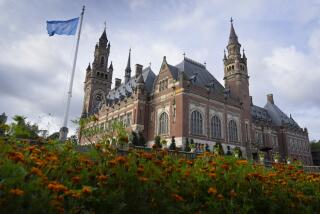3 Albanians to Face Kosovo War Crimes Charges
- Share via
VIENNA — Three men who are among the first ethnic Albanians indicted by a U.N. tribunal for war crimes in Kosovo were sent Tuesday to the international court after being arrested by NATO peacekeepers, prosecutor Carla Del Ponte said.
The men sent to face charges in The Hague are widely seen as minor players. However, diplomats and human rights experts said the move against ethnic Albanians, who have been viewed primarily as victims of Serbian violence, signaled that the court intends to bring to justice anyone who is responsible for atrocities, regardless of ethnicity.
“This should send a message that we will act against any person indicted for war crimes, regardless of their ethnicity,” said NATO Secretary-General George Robertson.
A fourth ethnic Albanian who was indicted at the same time was detained elsewhere Tuesday.
The U.N. tribunal had been criticized by Serbs for its failure to indict and arrest any ethnic Albanians, even though atrocities were known to have been committed against Serbian civilians. Few Croatian or Bosnian Muslim leaders also have been indicted for responsibility for war crimes allegedly committed during the wars in Croatia and Bosnia-Herzegovina earlier in the 1990s.
Former Yugoslav President Slobodan Milosevic is currently on trial at the tribunal for crimes against humanity for his command responsibility for Serbian forces in Kosovo.
The three ethnic Albanians were identified as Haradin Balaj, Isak Musliu and Agim Murtezi. The fourth indictee, Fatmir Limaj, is a member of Kosovo’s parliament and a senior official of the Democratic Party of Kosovo, or PDK, which is headed by former Kosovo rebel leader Hashim Thaci.
Limaj was allowed to leave the Yugoslav republic of Serbia, which includes the province of Kosovo, on Friday. His departure went unnoticed even though the North Atlantic Treaty Organization already had the indictment in hand, said Del Ponte, an oversight that the prosecutor called “outrageous.” A spokeswoman for Del Ponte said late Tuesday that Limaj had been arrested in another country that was part of the former Yugoslav federation and would also be sent to The Hague.
All four were indicted for the torture, illegal imprisonment, intimidation and murder of both Serbian and ethnic Albanian civilians in a prison camp operated by the ethnic Albanian rebels, who called themselves the Kosovo Liberation Army, or KLA. The indictment charges the four with 22 murders. Limaj is the only one indicted for command responsibility.
News of the arrests reverberated throughout the former Yugoslavia, where the scars of war have yet to heal and members of each ethnic group still tend to blame others for the violence.
In Kosovo, the popular reaction was muted because those arrested were minor figures and because a far more significant figure, Rrustem Mustafa, a former high-ranking KLA officer known as Cmdr. Remi, went on trial for war crimes this week before a panel of international judges in Kosovo.
Mustafa’s is the first war crimes trial in Kosovo, which has an ethnic Albanian majority and is now administered by the United Nations.
Kosovo officials expressed distress at the indictments and argued that because the ethnic Albanians were fighting a defensive battle, they were not guilty of committing crimes. They are also concerned that indictments of more significant Kosovo wartime leaders might be in the offing.
“Ethnic Albanians don’t accept that Albanians committed any crimes because the Albanians were in an uprising,” Adem Demaci, an ethnic Albanian separatist leader in Kosovo, told Serbia’s B-92 radio. “They were fighting a state that had been oppressing them for 100 years. So after 10 years of unsuccessful peaceful attempts ... they had to take up weapons.”
In Serbia, there was the sense that perhaps the international community was beginning to spread the blame more fairly.
Vojin Dimitrijevic, director of the Belgrade Center for Human Rights, said the move was a positive one for Serbia, where nationalist politicians had used the lack of indictments of ethnic Albanians to play on Serbs’ sense of being persecuted.
“The feeling that Serbs have of having been singled out will be alleviated,” he said.
*
Special correspondents Zoran Cirjakovic in Belgrade and Blerim Gjoci in Kosovo contributed to this report.
More to Read
Sign up for Essential California
The most important California stories and recommendations in your inbox every morning.
You may occasionally receive promotional content from the Los Angeles Times.













